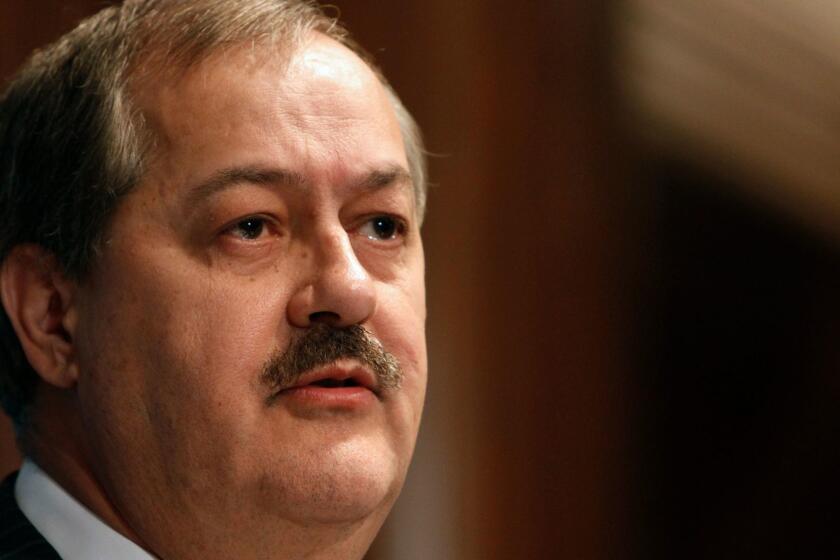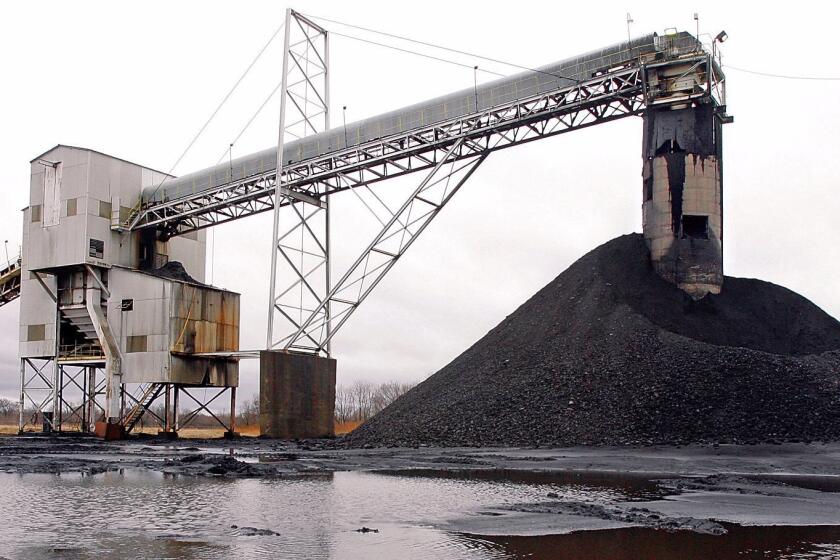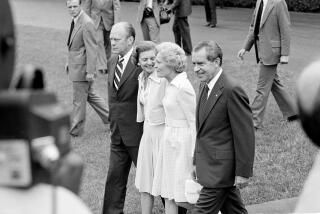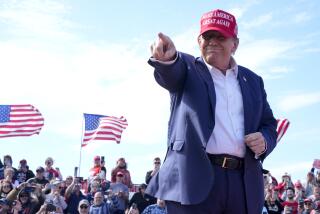Column: In America, anyone can run for president, even the convicted coal baron Don Blankenship
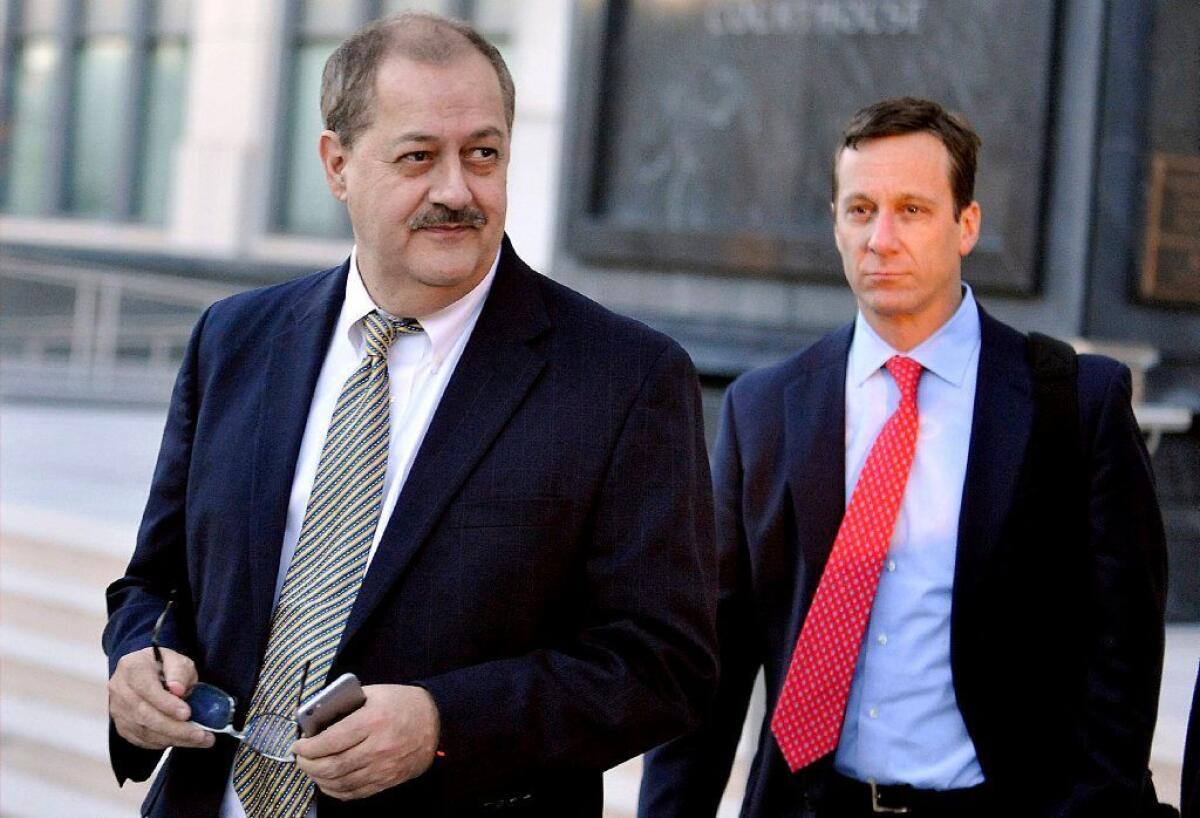
Ah, America, where any boy born in the hills of Kentucky and raised in a West Virginia home with an outhouse can run for president.
Even if he’s served a prison term for his role in a mine explosion that took the lives of 29 men, after managing to retire from his coal company with a pension valued at $15.7 million.
We’re talking about Don Blankenship, who was CEO of Massey Energy on April 5, 2010, the day of the explosion in its Upper Big Branch mine in West Virginia -- the worst U.S. mine disaster in 40 years.
I learned about, and struggled against, the ignorance and evilness of the United Mine Workers, much of the media, the ‘greeniacs,’ and much of corporate America.
— Presidential candidate Don Blankenship
Possibly counting on the adage that no publicity is bad publicity, Blankenship on Monday announced his candidacy for president on the Constitution Party ticket.
“Don chose today, Veterans Day, to make his announcement in recognition of America’s Veterans,” his website states.
Never mind the possible entry into the presidential race on the Democratic Party side of former Massachusetts Gov. Deval Patrick or former New York Mayor Michael Bloomberg. The real illustration of America as a land of opportunity is Don Blankenship’s candidacy. So let’s take a look at his qualifications.
Let’s start with his upbringing, as described on his website, dripping with faux humility.
“As the saying goes, we were poor but didn’t know it,” it says. “We had an outhouse that was nicer than the one most of our neighbors had.”
Blankenship was a student at West Virginia’s Marshall University in 1970 when virtually the entire football team was wiped out in a plane crash.
In the annals of executive chutzpah, one would be hard-pressed to find a more extreme case than Don Blankenship’s efforts to vindicate himself for his role in a huge mine disaster.
“This was my first experience with a horrific tragedy,” he writes. “Of course, the worst tragedy of my life was the day of the Massey mine explosion on April 5, 2010. I also have vivid memories of the day President Kennedy was shot, and of course of 9/11. Those were three heartbreaking days to be sure.”
That brings us back to his reign at Massey. According to testimony at his criminal trial, as CEO Blankenship was a relentless micro-manager who received daily reports of mine production and was known to “invariably press for more production even at mines that he knew were struggling to keep up with the safety laws,” the court noted.
Safety violations were numerous — 549 at the Upper Big Branch mine in 2009 alone. In the 15 months before the explosion, an appeals court observed, that mine ranked third in the U.S. in the number of “serious safety citations.”
Yet despite being “repeatedly informed of safety violations at Upper Big Branch,” the court observed, Blankenship “chose to prioritize production and pay fines rather than take steps necessary to prevent the safety violations from continuing.”
Blankenship’s version of his career is that as a coal executive, “I learned about, and struggled against, the ignorance and evilness of the United Mine Workers, much of the media, the ‘greeniacs,’ and much of corporate America.”
Blankenship plainly was used to getting his own way, according to a 2009 ruling by the U.S. Supreme Court. That case originated in a lawsuit in which Massey had been ordered to pay $50 million in a contract dispute. While the case was on appeal to the West Virginia Supreme Court, Blankenship bankrolled a $3-million campaign aimed at unseating one of the justices.
The Flint, Mich., water crisis has been garnering all the headlines lately, but we shouldn’t forget its precursor in news coverage devoted to man-made environmental disasters.
Blankenship’s victorious candidate, Brent Benjamin, refused to recuse himself when the Massey case came up. He voted to overturn the $50-million verdict.
“The facts now before us are extreme by any measure,” wrote Justice Anthony M. Kennedy for the U.S. Supreme Court’s 5-4 majority. “The parties point to no other instance involving judicial campaign contributions that presents a potential for bias comparable to the circumstances in this case.” The Supreme Court kicked the case back to West Virginia, where the judges — this time with Benjamin absent — again ruled in Massey’s favor.
Blankenship was indicted in 2014 in connection with overseeing policies that systematically placed profits ahead of safety. He was convicted by a federal jury in 2015 of a single misdemeanor for conspiring to violate federal mine regulations and sentenced to a year in jail, a term he completed in May 2017.
The mine disaster and his subsequent conviction didn’t make much of a dent in Blankenship’s personal resources. According to Massey’s 2010 proxy statement, he had been paid a total of $38.2 million over his final three years as CEO and was entitled to a pension valued at $5.7 million, as well as $27.2 million in a deferred-compensation account and a “salary continuation retirement benefit” that would pay him as much as $18,241 a month for 10 years after his retirement.
Nevertheless, Blankenship set out to whitewash his reputation, determined to appeal his conviction all the way to the Supreme Court. Within days of his release from prison, he wrote an open letter to President Trump to commiserate over their shared experience of “relentless and false attacks on our reputation by the liberal media.” In the letter, he described himself as having “a very special affection for coal miners and, therefore, a great interest in coal miner safety.”
Peabody Energy, the nation’s largest private-sector coal company, joined several of its fellow coal producers in bankruptcy in 2016.
Blankenship also issued a pamphlet portraying himself as “an American political prisoner” based on the argument that he had been railroaded via “misconduct by prosecutors, judges, law clerks, and the FBI, as well as Senator Joe Manchin, and the head of the Mine Safety and Health Administration.” Manchin (D-W.Va.) is a former governor of West Virginia. Blankenship’s appeals were turned down and the Supreme Court declined to take the case.
Most recently, however, a U.S. magistrate in West Virginia recommended that Blankenship’s conviction be overturned, finding that the government had failed to turn over possibly exculpatory documents. In his Aug. 26 opinion, the magistrate found “not...a scintilla of evidence” that the prosecutors at Blankenship’s trial “acted in bad faith or with malice.”
He added that while it’s possible that Blankenship might not have been found guilty had the documents been turned over, “it is equally as likely” that he might have been convicted anyway. A federal judge is currently pondering whether to overturn the verdict.
As for Blankenship’s political interests, he ran for the U.S. Senate in West Virginia on the ticket of the far-right Constitution Party, which calls for the phase out of Social Security and opposes LGBTQ rights, among other positions.
His campaign was notable for what came across as a racist attack on Senate Majority Leader Mitch McConnell (R-Ky.) by suggesting McConnell was in thrall to “China people” associated with his wife, Transportation Secretary Elaine Chao. She immigrated to the U.S. from Taiwan as a child. Blankenship didn’t make it onto the ballot. Manchin won reelection.
Blankenship is again running on the Constitution Party ticket, this time for president. Almost makes one proud to be an American. Almost.
